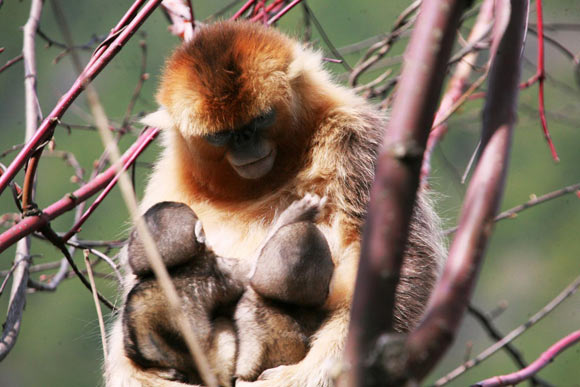An international team of scientists has discovered that female golden snub-nosed monkeys (Rhinopithecus roxellana), an endangered species of Old World monkey found in the seasonally cold mountainous forests of south-west China, are happy to feed other monkeys’ offspring. This is the first evidence of a phenomenon called allomaternal nursing in an Old World nonhuman primate.
“Although humans had been known to practice wet nursing over many centuries, little was known about the practice in our primate relatives,” said team member Dr. Cyril Grueter, senior lecturer in the School of Human Sciences at the University of Western Australia.
“What we found was that the milk sharing was confined to the first three months of the infant monkey’s life and it occurred predominantly between related females who shared nursing duties in a reciprocal manner.”
Dr. Grueter and his colleagues from Australia, China and the United States observed groups of golden snub-nosed monkeys in the Shennongjia National Nature Reserve located in central China.
Over the course of five birth seasons, the researchers discovered that 40 out of 46 infants (87%) suckled from one or more females that were not their mothers, with 22 out of 46 (48%) suckling from at least two additional females.
Allomaternal nursing was seen predominantly during the first three months of an infant’s life.
Four of the six infants, who did not receive nursing from another female died during winter, whereas only six of the 40 infants who were allonursed died.
Relatedness — usually either the grandmother or aunt of the infant — and reciprocity played important roles in allomaternal nursing.
Around 90% of mothers (25 of 28) reciprocated nursing during the current or following year if that female had nursed their own infant.
“Infants that received additional doses of milk from females other than their mother had a higher chance of surviving,” Dr. Grueter said.
“We believe that this behavior may provide a buffer for mothers and young against the vagaries of their harsh environment.”
The research is published in the journal Science Advances.
_____
Zuofu Xiang et al. 2019. Routine allomaternal nursing in a free-ranging Old World monkey. Science Advances 5 (2); doi: 10.1126/sciadv.aav0499








